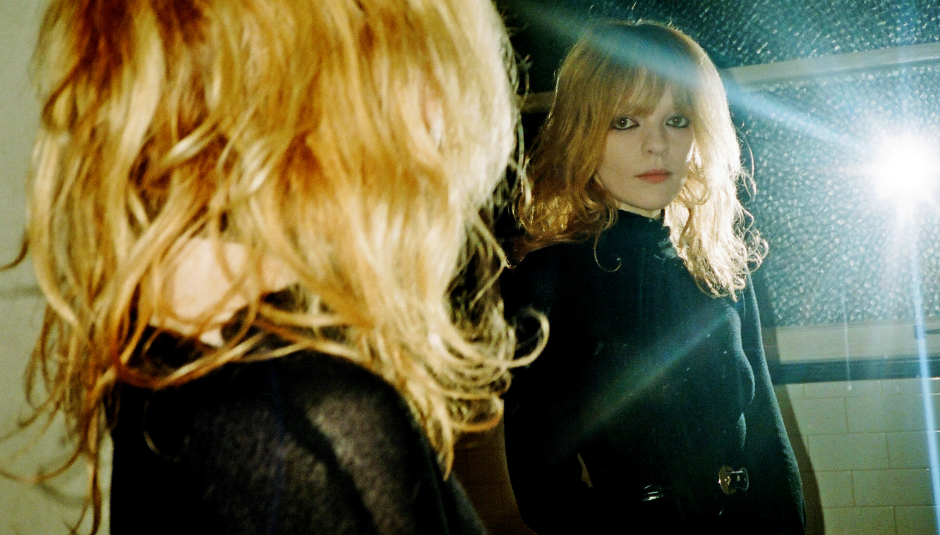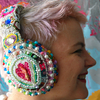Unsurprisingly, conversing with California-based folk musician Jessica Pratt is almost as psychedelic an experience as listening to her records. With a measured, casual calm, she mentions to Drowned In Sound over Skype how she got mugged on the street a few weeks ago, which forced her to reschedule this interview. If this was her first mugging – which it was – you simply couldn’t tell. Getting robbed in broad daylight is usually the type of experience people often retell by channeling the same emotional rush and adrenaline as when it happened.
Pratt, however, simply laughs it off with the poise of someone who recollects this incident as a very old memory. “My purse had my passport in it, my credit cards, and I was leaving for Europe pretty soon. I just had to do all this work to get everything in order. It was pretty hairy actually. But everything’s all fine now. It feels like it’s a long time ago now. I’m glad I got everything figured out.”
Regarding finding solace in retrospect, Jessica Pratt’s new album Quiet Signs inspires the listener to re-examine the term ‘timelessness’ further without trying super hard. Nowadays, musicians have more tools at their disposal than ever to articulate the overwhelming happening that is our existence. The quest for immortality has always been this habitual raison d’etre for pop music; to capture that essence of the times within sound, instrumentation, and words.
Within the diffused, murky space of her songs, Pratt opts for surrender to our inevitable decay and mortality. Tunes like ‘Crossing’ and ‘Silent Song’ have the Homeric quality of medieval church hymns, relics that recall something beyond our immediate understanding. The former doesn’t even bother applying fully-formed lyrics: Pratt’s feathery voice seems to drift completely on the wavelengths of her subconsciousness.
It’s pretty incredible how music can be just as mysterious to its maker as to the listener, and naturally, our conversation touches base with themes and notions beyond the tangible and sensory.
DiS: Are there other disciplines you hang your hat on besides music?
Jessica Pratt: I do think that music is the dominant element in my life. I think we’re talking specifically about two things: I said in a lot of interviews that early in my career, I was a little lackadaisical about pursuing music super avidly. I just played shows live whenever I felt like it, very intermittently. Once I actually had a career to tend to, I dedicated myself very intensely to it. At the same time, there has been a lot of time passed between albums. That’s not something that I planned, it just kind of happened that way. But my first record came out in 2012, and the next in January 2015, so in the great scheme of things, that’s not too bad.
The gap between Quiet Signs and On Your Own Love Again is four years; and there were many contributing factors to that. I decided to want to work on a record sooner and finish it sooner. Unfortunately, you can’t just snap your fingers and produce something you’re happy with all the time. I wished for that super-skill many times. It took a lot longer than I thought it would. Hopefully the next time it will be a little quicker. But yes, music is something I think about all the time. I do have many interests, but I don’t practice other things with the same dedication that I do music. I do a bit of photography, making clothes, and things like that. But those activities I do for fun.
Has your approach to performing music changed radically since you’ve had an audience?
As long as I play music I’m going to try and put as much motivation in that as possible. I do it because I feel intrinsically drawn to do it. And I’m not trying to tailor what I’m making into any sort of ‘career move’. At least, for me personally. That’s something that other people can do, and that can totally work for them. But I think the nature of my music doesn’t really complement thinking about it in those terms.
At the same time, when you have a career in music and people start recognizing who you are, they digest your music, critique your music. And at some point, there is no way to not be aware of that world. You always want to hone your skills and get better at what you do, and having an audience has really benefited me in that way. But I try to prevent the creatively fertile parts of my brain from being contaminated with worry or preconceptions about things, and it’s a very delicate balance.
More delicate than ever I reckon. You’ve never hidden your admiration for older pop records, ranging from Nina Simone to Paul Williams. Those artists had that luxury to disappear and no one would bat an eye. When you think about it, it’s strange how that’s so frowned upon now. Nowadays, so many parties in the industry depend on artists being ever-present on the digital drip.
Yeah, you’re right, and when people do disappear, people start to take great notice of that – when you stop having any kind of an online presence. And you know, depending on your situation, it is a bit like you stop existing for a little bit. Hopefully, if you are somebody who makes really great music people won’t care and keep waiting for the next thing you put out. But you’re right, we are definitely living in an age when you are required to stick yourself in people’s minds as frequently as possible, through as many avenues as possible.
I think the various social media platforms can be used for a lot of good, and people can get the exposure they otherwise wouldn’t get through other more traditional means. But it’s definitely very tricky, and you can get totally sucked into it. I think anyone who experienced any kind of sustained attention… if you have to keep all that stuff up, there’s often a reaction to it. And it can make you want to move to the country and live without electricity or something.
Your last record On Your Own Love Again was conceived within the comforts of home, whereas Quiet Signs required you to travel back and forth between LA and New York. Do you put that in consideration more, the scenery in which you record and how that influences your work?
No, and you know what? It’s funny, I feel like I’m considering that more now, in retrospect, than I ever have before. In fact, when I first considered going to the studio in Brooklyn, before the record happened, I was kind of conflicted about it. One: because I wasn’t used to recording in a studio. And two: I was a little fearful of the process of writing at home and plucking yourself out of that fertile creative space, with much time passing, and going to this completely other environment. It ended up working out great, but I was a little nervous about it. So in a way, I’m glad that the studio experience happened the way it did. It has given me a little more faith in the resilience of the songs I write.
Writing and recording an album doesn’t always have to be this really careful, paranoid, planned-out process. That’s all pretty fear-based; you don’t want to lose the magic, and it causes a lot of tension. So I’m glad some doors have been opened for me. But whether the environment influences my music, that’s something I haven’t dwelled on. If anything, I think it’s maybe a little of the opposite: I pride myself on being able to get to a certain musical place no matter where I am, as long as I’m stationary. I think that’s true to some degree, in my case.
But I think you are right; I think there is inevitably an influence based on where you are. You know, New York is not a bad place to be; it’s an exciting and interesting place. It’s hard to tell what you’re actually hearing or whether it’s just your personal associations. But I feel I can hear it may be a little bit in some songs. It will be interesting to see how the next record goes… I have no idea where or when that will happen.
That’s a good point you make, about being stationary and transporting yourself elsewhere. The studio is always considered this prosaic environment, but your songs are always super psychedelic to me, they transport me to fictional, maybe romanticized places. ‘Fare Thee Well’ sounds like it could have been recorded in the same Mediterranean scenery as Leonard Cohen’s ‘So Long Marianne’.
That’s a very flattering reference. But it’s true, I have super solid visual ideas about the location for different songs that are not factual. At least not in our reality. You definitely visualize things when you write, and I think that kind of speaks to the experience of being able to tap into that place, no matter where you are. Because that’s not necessarily relevant to where you physically are on the planet. But it is an interesting concept. I’m excited to explore that side of it more in the future.
That’s so strange about music with an unfinished quality to it. This might sound a bit like I’m wearing a tin-foil hat, but I’m always entertained in spiritual, metaphysical and sci-fi imagery listening to a record like yours. Because who’s to say these songs aren’t messages from your future self or a parallel dimension, the mysterious things that sort of bubble up once your surrender to something, as opposed to accurately documenting it?
I’m totally on board with that. In a lot of ways, I think that is our life experience. Everyone has a higher self, and you can consider that to be a totally physiological thing. It doesn’t have to be mystical at all. I think you have an inner knowing and even looking back at the content of certain songs or records you made; you can almost see yourself telling yourself something. Or giving yourself advice, or working things out. From a place of knowing that you maybe didn’t understand that you were coming from at the time. Yeah, I think that’s very complex and interesting.
Are there records that do that to you, where you always feel there is something beyond the reach of what you hear, and what you learn about it?
Yeah, there are lots of records like that. I guess this is kind of an obvious reference, but just because I have been revisiting it recently: the first Leonard Cohen record. Obviously, it’s such an incredibly well-crafted work. But there’s so much weight to the words on it, it almost accumulates this mystical sadness, where you can feel you can listen to a song twenty times in a row and derive different meanings. Or not derive all the meanings and be in awe of this thing that feels very important.
I recall you mentioning in one article, while addressing the song ‘Aeroplane’, that being in an aircraft allowed you to shut yourself off. I had a similar experience just last week flying home from Budapest, where even familiar music just starts to sound differently. Economy class is never comfortable, but I felt my brain homing in deeper on the music to overcome this discomfiting situation mentally, almost like a survival mechanism.
I agree, it’s really rare we are ever so cut off from any outside influence. And you’re not only isolated from outside influence, but you’re also in the sky for many hours. There is no opportunity for escape. And I think your brain adapts to that. In a way, it’s this sensory deprivation, where things seem wider and more interesting than maybe on the ground, where you have everything at your disposal. I definitely had the same kind of experience, listening to something without thinking too much about it in that instance. It would seem like it achieves greater depth or a greater emotional impact.
Does that also happen when you play guitar and sing? Does performing allow you to perceive time differently?
Definitely, it’s like a fluid state where you’re only partially aware of what’s happening. You are aware of your impulses but you are not really examining them. When you’re through with it, looking back on things, it’s difficult to pinpoint the sequence of events that resulted in a song or a melody. It feels like it all happened while you weren’t paying attention. But of course, you were actively visiting that place. That’s always an interesting experience.
Dreams are weird like that too, this sequencing of images you conjure without being conscious. In an interview with Pitchfork’s Sophie Kemp, you talked about keeping a dream journal. Can you elaborate on that a little bit?
I kept a dream journal on-and-off since I was fourteen or fifteen. It hasn’t been religious; there have definitely been periods of two, three years when I slacked on it a bit. But I always come back to it; because I’ve had times where I got pretty vivid dreams. And I always felt very connected to them. Partially because I’m naturally inclined towards dreaming; I was raised by my mother and my great grandmother, and they would always talk about their dreams and how they felt connected to them as well. I think it’s something I was trained from an early age to take seriously. But also I find it humorous, depending on what I dreamt. I was taught that there is always a lot to take from your dreams, and I think that’s very true. I think many people totally disregard their dreams, and they miss out on a lot by doing so.
The dream journal allows me to keep track of them. Even the difference between typing something out and physically writing something out with your hand, that process of articulating images and messages from dreams allows you to understand the messages. I’ll be trying to describe something and be aware of a double meaning as I’m writing it out. Documenting it in a way that takes some time. Physically writing it out, it taps into something else. I tried to do it in other ways, like typing, but that doesn’t feel quite as lucrative. Any artistic skills I had when I was younger have kind of dried up, so I usually try to be very descriptive with words, down to the very minute details. If there’s something that’s particularly striking in an individual way, and I don’t want to forget. I will sometimes try to draw it out, like a structure or some other specific detail.
It must be strange to read some of the entries back. Our minds are pretty predisposed to letting dream imagery be buried within, not to mention how some dreams seem random and just plain bizarre.
I have been very active in doing that, I have multiple dream journals. This is interesting because there’s this video on the internet taken from a documentary of about Guided By Voices. Robert Pollard is in a room with his bandmates, going through all these notebooks of old songs – you can only imagine how many there are – but there is no musical notation or anything, he’s just looking at the lyrics and a lot of them are not necessarily well-known Guided By Voices songs. Just ideas they worked on.
He then lands on a page, he starts reading the first couple of lyrics and starts singing the melody perfectly. And the rest of the band just immediately plugs in. They all have this crazy memory of songs, even if they haven’t actually done anything with them. I think the dream journal is the same kind of thing: sometimes I’ll go back read an entry from a couple of years ago. I’ll read the first couple of sentences and ask myself: “What is this random frame?” I’ll see a detail I’ll remember and the dream totally floods back. So I don’t know; I think those two things are linked. Musical memories and dream memories, I think they reside in a similar place. I remember dreams from many years ago, though not all of them.
For many people it’s counter-intuitive to document dreams. Kind of makes you wonder how the act of documenting them changes your reality.
I think that’s definitely true, but I don’t think there has been a ton of research on that department. Dream research is still in its infancy, and again, it’s something people don’t take seriously for some odd reason. They think of it like this ‘laughable’ thing, these meaningless sequencing of images that have no bearing on your actual life. Even though it’s coming from your own brain. Everyone has random anxiety dreams where it’s like, these are obvious elements from my life, sources of anxiety… and this is my brain processing them. But I think it goes a lot deeper than that. Maybe it does seem counter-intuitive to write down these crazy details, but I think it keeps my psyche organized a little bit. It helps me process things. Once I get disconnected from it and stop doing it, I feel a little messier.
Maybe that’s the reason why you spoke about being mugged for the first time as if you experienced it before.
[laughs] I mean yeah, everyone has different coping mechanisms. I personally feel like that’s how I process things. And it’s very beneficial for me. But I think a lot of people haven’t been taught that this is something they can do. When you write down your dreams, you remember them more clearly. So there’s something to be said for that.
Quiet Signs is out now via City Slang. For more information about Jessica Pratt, including forthcoming tour dates, please visit her official website.
Photo Credit: Dola Borani






















